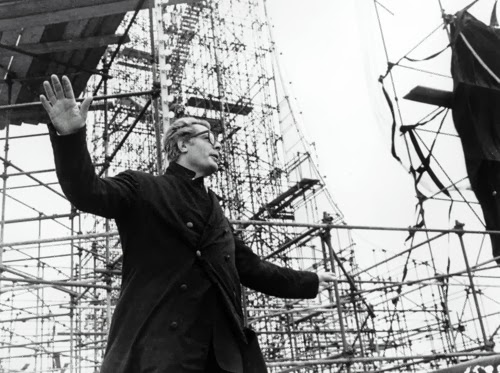I've brought up this strange apparent paradox before and I've often tried to figure out a solution. There are certain acclaimed directors whose work I have criticized largely because they don't make much sense. However, I then find myself turning around and talking about how great other filmmakers are despite the fact that they too could have the same arguments made about them. Even I've occasionally taken a stab at more surreal writing from time to time.
This brings me to the big question: when is surrealism a good thing? Where does surrealism end and laziness and incompetence begin? What is it that seems to work in the movies of David Lynch or Stanley Kubrick that I fail to see in the likes of Jean-Luc Godard or Federico Fellini?
Now if you are a frequent reader of my blog or know me personally you might already know I'm a huge David Lynch fan, and this detail in particular I find rather curious considering that despite my feelings on Fellini, I happen to know for a fact he was a huge influence on Lynch. Don't believe me? Let's ask the man himself:
So this brings up a peculiar case. One of my favorite directors was heavily inspired by a man whose work I can't stand, and if you've ever seen any of Fellini's movies it's not too hard to see the connection. (though it's also not too hard to see how Lynch may have been inspired by Kubrick, another one of my favorite directors). A film by Fellini such as 8½ makes just about as much sense as Lynch is known for, if not in fact even less.
In fact, if you look at them closely, Fellini's 8½ and Lynch's Inland Empire seem to have a similar plot. Both films utilize a similar structure, providing a surreal fantastical journey framed around a character trying to make a movie.
In 8½ it's a struggling director named Guido, in Inland Empire it is an upcoming actress named Nikki. In each case we see the central character trying to make this film but undergoing personal issues that get in the way. Guido is apparently going through some sort of writer's block, while Nikki is seemingly struggling to deal with the stress that may inevitably come with an extremely demanding lead role.
In both cases, we see the strange ways their respective protagonists try to deal with their stress. Guido and Nikki seem to retreat into their minds for refuge, which results in surreal delusions, hallucinations, and fantasies. As their "stories" (I use that term loosely for both) progress, the lines between the world of their movie, the world of reality, and the world of the characters' fantasy begin to blur.
These two scenes suddenly bring us back into something that might be considered reality. Both Nikki and Guido are still alive, and they are on the set of their films. We find out that Nikki's been acting the whole time and she is congratulated for her excellent performance, while Guido is almost ready to give up on his movie but changes his mind. In other words, both seem to overcome their psychological problems and complete their films.
Finally, both 8½ and Inland Empire manage to end on a very ambiguous note. Inland Empire ends by returning to Nikki's house, where the movie began. This leads into a very odd segue as a woman with a prosthetic leg steps into a room and utters "sweet". The ending of 8½ makes just about as much sense, where just as Guido is about to start shooting, every single person who has appeared at any point in the movie suddenly appears on set, but the focus shifts toward a marching band, and in particular a young boy dressed in a white version of Guido's schoolboy outfit.
I draw this comparison precisely to emphasize the peculiarity of this situation. I tried to be fair to both films but I won't claim to respect 8½ any more than I have said, nor will I claim Inland Empire is my favorite of Lynch's films. Still, I find it curious considering how similar these two are that I am fascinated with Lynch but can't quite seem to get into Fellini.









Very interesting post, thanks for guiding me toward it. Inland Empire is still the only Lynch film I've seen but I really like it - and I really like 8 1/2 too. However, I think it's perfectly okay not to like the 'original'. Directors (and anyone else, really) can draw inspiration from different things and even if you like the new thing that comes out of it, that doesn't mean you have to like the inspiration.
ReplyDelete